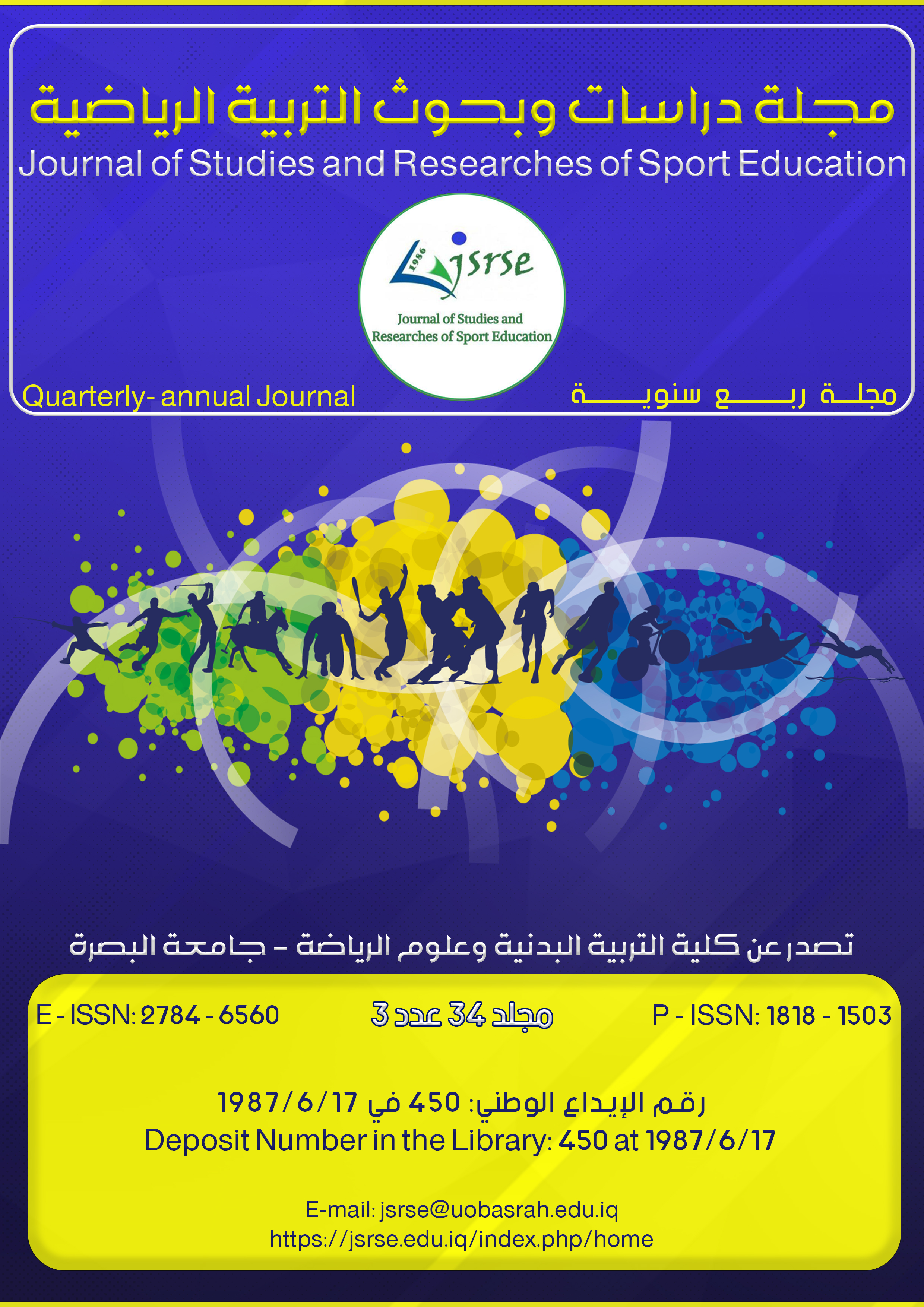القيادة المسيئة للمدرس وأثرها على الطاقة العلائقية لدى الطلاب خلال درس التربية الرياضية في المدارس الإعدادية
محتوى المقالة الرئيسي
الملخص
هدف البحث إلى التعرف على أثر القيادة المسيئة لمدرسي التربية الرياضية في الطاقة العلائقية لدى طلاب المدارس الإعدادية التابعة لمديرية تربية بغداد الكرخ الأولى، وقد اتبع الباحث المنهج الوصفي بأسلوب المسح وأسلوب العلاقات الارتباطية لملائمتهما طبيعة الباحث وأهدافه، وكانت عينة البحث هم طلاب المدارس الإعدادية للبنين والتي تقع ضمن حدود مديرية تربية بغداد الكرخ الأولى للعام الدراسي (2023-2024) والبالغ عددهم (16450) طالب، ينتمي هؤلاء الطلاب إلى (41) مدرسة إعدادية للبنين، واستنتج الباحث :- يمتلك مدرسو التربية الرياضية في المدارس الإعدادية التابعة لمديرية تربية بغداد الكرخ الأولى مستوى منخفض من سلوكيات القيادة المسيئة من وجهت نظر طلابهم، يوصي الباحث مدرسي التربية الرياضية بتحفيز المشاركة الفعالة وتعزيز التفاعل الاجتماعي بين الطلاب، عبر تنظيم فعاليات وأنشطة رياضية تشجع الطلاب على التعاون والتواصل فيما بينهم، فضلاً عن تقديم تشجيع ودعم مستمر لهم لتعزيز ثقتهم بأنفسهم وتحفيزهم لتحقيق النجاحات الرياضية
تفاصيل المقالة

هذا العمل مرخص بموجب Creative Commons Attribution-NonCommercial 4.0 International License.
المراجع
Amah, O. E. (2018). Leadership styles and relational energy: Do all leaderships styles generate and transmit equal relational energy? South African Journal of Business Management, 49(1), 1–6. https://doi.org/10.4102/sajbm.v49i1.231
Baker, W. E. (2019). Emotional Energy, Relational Energy, and Organizational Energy: Toward a Multilevel Model. Annual Review of Organizational Psychology and Organizational Behavior, 6(1), 373–395. https://doi.org/10.1146/annurev-orgpsych-012218-015047
Baran, M., & Jones, J. (2017). Mixed Methods Research for Improved Scientific Study. In Sampling in Research (Issue July, pp. 107–121). https://doi.org/10.4018/978-1-5225-0007-0.ch006
Braha, M., & Karabulut, A. T. (2023). Energizing Workplace Dynamics: Exploring the Nexus of Relational Energy, Humor, and PsyCap for Enhanced Engagement and Performance. Behavioral Sciences, 14(1), 23. https://doi.org/10.3390/bs14010023
Dabas, N. (2022). Impact of Abusive Leadership on Employees’ Productivity. The International Journal of Indian Psychology ISSN, 10(4), 149–167. https://doi.org/10.25215/1004.017
DENG, Y. (2021). WHEN EVERYBODY WANTS WHAT YOU WANT: THE MODERATING EFFECT OF TEAM ENVY OF SUPERVISORS ON THE RELATIONSHIP BETWEEN ENVY, RELATIONAL ENERGY AND SUBSEQUENT WORK BEHAVIORS. In Media Konservasi. the Oklahoma State University.
Drory, A., Shkoler, O., & Tziner, A. (2022). Abusive leadership: A moderated-mediation through leader-member exchange and by organizational politics. Frontiers in Psychology, 13(November), 1–15. https://doi.org/10.3389/fpsyg.2022.983199
Ehsan, I. (2020). Impact of Abusive Leadership on Project Success with Mediating Role of Workplace Deviance and Moderating Role of Agreeableness by Iqra Ehsan. 1–108.
Emmerling, F., Peus, C., & Lobbestael, J. (2023). The hot and the cold in destructive leadership: Modeling the role of arousal in explaining leader antecedents and follower consequences of abusive supervision versus exploitative leadership. In Organizational Psychology Review (Vol. 13, Issue 3). https://doi.org/10.1177/20413866231153098
Fan, J., Wei, X., & Ko, I. (2021). How do hotel employees’ feeling trusted and its differentiation shape service performance: The role of relational energy. International Journal of Hospitality Management, 92(August 2019), 102700. https://doi.org/10.1016/j.ijhm.2020.102700
Fischer, T., Tian, A. W., Lee, A., & Hughes, D. J. (2021). Abusive supervision: A systematic review and fundamental rethink. Leadership Quarterly, 32(6), 101540. https://doi.org/10.1016/j.leaqua.2021.101540
Fortwengel, J. (2023). Tracing the affective journey of an interorganizational network: Positive and negative cycles of relational energy in a network space. Scandinavian Journal of Management, 39(3), 101280. https://doi.org/10.1016/j.scaman.2023.101280
Ghazi, M. A., Abd, M., Kadhim, A., Hasan Aldewan, L., Jawad, S., & Almayah, K. (2024). Facial fingerprint analysis using artificial intelligence techniques and its ability to respond quickly during karate (kumite). JOURNAL OF HUMAN SPORT & EXERCISE. https://doi.org/10.14198/jhse.2024.192.20
Hassan, M. M., & Musharef, A. J. (2024). The effect of the mental training method accompanied by standard feedback in learning the technical performance of the forward roll diving movement in artistic gymnastics for men. Journal of Studies and Researches of Sport Education, 34(1). 10.55998/jsrse.v34i1.473
Jabbar, U. Bin, Saleem, F., Malik, M. I., Qureshi, S. S., & Thursamy, R. (2020). Abusive leadership and employee commitment nexus: Conservation of resources theory perspective. Cogent Business and Management, 7(1). https://doi.org/10.1080/23311975.2020.1857993
Johnson, R. E., Venus, M., Lanaj, K., Mao, C., & Chang, C. H. (2012). Leader identity as an antecedent of the frequency and consistency of transformational, consideration, and abusive leadership behaviors. Journal of Applied Psychology, 97(6), 1262–1272. https://doi.org/10.1037/a0029043
Kadhim, M. A. A., Mashi, A. A. A., Al-Diwan, L. H., & Ghazi, M. A. (2024). Understanding the Mechanism of Conducting Benchmark Test for the Infrastructure of Physical Education Curricula in the Age of Artificial Intelligence. International Journal of Elementary Education, 13(1), 8–12. https://doi.org/10.11648/j.ijeedu.20241301.12
Lamyaa, H. M., & ruaa, M. A. (2015). The impact of a proposed curriculum lessons Educational motor using effective teaching In the development of creative thinking for the children of the preparatory stage. Journal of Studies and Researches of Sport Education, 42, 32–48. https://www.iasj.net/iasj/article/104025
Liang, H. Y., Chu, C. Y., & Lin, J. S. C. (2020). Engaging customers with employees in service encounters: Linking employee and customer service engagement behaviors through relational energy and interaction cohesion. Journal of Service Management, 31(6), 1071–1105. https://doi.org/10.1108/JOSM-06-2018-0175
Liu, D., Gui, S., Zhang, B., Gao, H., Yu, X., & Wu, M. (2022). The influence of leader relational energy on employee cognitive well-being: A moderated mediation model. Frontiers in Psychology, 13(February), 1–12. https://doi.org/10.3389/fpsyg.2022.940180
Lutfiani, N., Sudaryono, Rahardja, U., Aini, Q., & Isma Graha, Y. (2019). Validity of Test Instruments. Journal of Physics: Conference Series, 1364(1). https://doi.org/10.1088/1742-6596/1364/1/012050
Mahmood, Q. A. (2024). Adaptive leadership of coaches and its relationship to the relational well-being within Nineveh Governorate football clubs from the point of view of their players. Journal of Studies and Researches of Sport Education, 34(2).
Mashkoor, N. H., & Othman, I. A. (2023). Perceived Self-Efficacy and Its Relationship to Dexterous Thinking Among Third-Stage Female Students in the College of Physical Education and Sports Sciences - University of Basra. Journal of Studies and Researches of Sport Education , 33(1), 69–83. https://doi.org/10.55998/jsrse.v33i1.376
mashkor, N. hamed, & Mohammed, L. H. (2017). Study the level of social interaction and its relationship to aggressive behavior on the field for some youth teams. The Scientific Journal of Sports Science and Arts, 16(016), 59–67. https://scholar.google.com/scholar?hl=ar&as_sdt=0,5&cluster=13309804359501948191
Murari, K. (2020). Abusive leadership – a Barrier to Employee Empowerment. European Journal of Business and Management, Vol.5(No.4), 8–21.
Niina, N., & Seppälä, T. (2020). Servant Leadership and Abusive Leadership on Employee Work Engagement: the Role of Psychological Safety and Leader …. Aalto University School of Business Information and Service Management.
Owens, B. P., Baker, W. E., Sumpter, D. M. D., & Cameron, K. S. (2016). Relational energy at work: Implications for job engagement and job performance. Journal of Applied Psychology, 101(1), 35–49. https://doi.org/10.1037/apl0000032
Qu, J., Khapova, S. N., Xu, S., Cai, W., Zhang, Y., Zhang, L., & Jiang, X. (2023). Does Leader Humility Foster Employee Bootlegging? Examining the Mediating Role of Relational Energy and the Moderating Role of Work Unit Structure. Journal of Business and Psychology, 38(6), 1287–1305. https://doi.org/10.1007/s10869-023-09884-w
Sainz, M., & Baldissarri, C. (2021). Abusive leadership versus objectifying job features: Factors that influence organizational dehumanization and workers’ self-objectification. Journal of Applied Social Psychology, 51(8), 825–837. https://doi.org/10.1111/jasp.12803
Samian, Riantoputra, C. D., & Budihardjo, A. (2021). Why employees endorse abusive leaders: the role of trust. Human Resource Development International, 24(2), 133–150. https://doi.org/10.1080/13678868.2020.1810475
Simard, K., & Parent-Lamarche, A. (2022). Abusive leadership, psychological well-being, and intention to quit during the COVID-19 pandemic: a moderated mediation analysis among Quebec’s healthcare system workers. International Archives of Occupational and Environmental Health, 95(2), 437–450. https://doi.org/10.1007/s00420-021-01790-z
Song, H., Yin, Q., Zhang, Q., & Li, Y. (2023). The Impact of Compulsory Citizenship Behavior on Job Performance of New-Generation Knowledge Workers: The Roles of Ego Depletion and Relational Energy. Psychology Research and Behavior Management, 16, 2367–2381. https://doi.org/10.2147/PRBM.S413932
Taherdoost, H. (2021). Data Collection Methods and Tools for Research; A Step-by-Step Guide to Choose Data Collection Technique for Academic and Business Research Projects. International Journal of Academic Research in Management (IJARM), 2021(1), 10–38.





 IASJ
IASJ CC-BY-4.0
CC-BY-4.0 turnitin
turnitin ISSN
ISSN DOAJ
DOAJ Crossref
Crossref GoogleScholar
GoogleScholar Orcid
Orcid